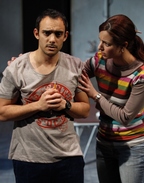SITE GUIDE
SEARCH
REVIEWS
REVIEW ARCHIVES
ADVERTISING AT CURTAINUP
FEATURES
NEWS
Etcetera and
Short Term Listings
LISTINGS
Broadway
Off-Broadway
NYC Restaurants
BOOKS and CDs
OTHER PLACES
Berkshires
London
California
New Jersey
DC
Connecticut
Philadelphia
Elsewhere
QUOTES
TKTS
PLAYWRIGHTS' ALBUMS
LETTERS TO EDITOR
FILM
LINKS
MISCELLANEOUS
Free Updates
Masthead
A CurtainUp Review
Urge for Going
By Elyse Sommer
|
I like the politics of subject, verb, object. Or no verb and
object. Of rhyme, or no rhyme.— Adham, who has continued to stick to his commitment to intellectural rather than political pursuits, even though the closest he's come to doing so is to foster his children's education so that they might have a chance to go to college and escape from their unstimulating surroundings.
|

Omid Abtahi and Tala Ashe
(Photo: Carol Rosegg) |
The time is 2003, the place a Palestinian refugee camp in South Lebanon. Transitory as it all looks and feels Adham (Ramsey Faragallah) and his wife Abir (Jacqueline Antaramian) and her brothers Hamzi (Demosthenes Chrysan) and Ghassan (Ted Sod) have been living there since they fled the West Bank during the 1967 Arab-Israeli War. Adham and Abir's daughter Jamila (Tala Ashe) and son Jul (Omid Abtahi) have never lived anywhere else.
Mona Mansour's drama, Urge For Going, another of the Public Theater's offerings of an original play at a bargain priced $15, is structured as a coming of age drama within the larger framework of the frustrating conflict that has kept the Middle East in a constant state of hostilities. The title ties together the threads connecting the larger historic story with the more personal familial threads since it mean different things to Jamila and her parents and uncles.
To the older generation leaving the camp in which they've been trapped for so long means going back to their home, the West Bank. But to Jumila it means going away from the confines of the camp to experience the world — London, Paris, Iceland. . .with her parents' and uncles' first choice destination just another place.
Mansour's aim to build a navigable bridge for her play's world view and more intimate story telling to interlock is seamlessly realized thanks to Hal Brook's direction and Jason Simms' authentically atmospheric scenic design. Brooks has also elicited fine performances from the cast, especially Ramsey Faragallah and Jacqueline Antaramian as the parents who never expected to raise their children in these dour surroundings.
While the older members of the family are united in their dream of returning to the home they had to abandon so many years before, they have much to argue about in discussing their history,. This helps to set up the different dramatic styles. Thus the actors come on stage and deal with the background aspects of the play in presentational style, speaking to the audience and each other. With everyone apparently convinced that their opinion is the right one, the audience is drawn into this part kitchen table argument and and part active storytelling, regardless of their own opinions about the views expressed.
Unlike the politically outspoken uncles, Jamila's father Adham is an intellectual whose academic life in London was cut short--and in fact ended by the need to rescue Abir's mother. He insists that he is not political and In keeping with this declares that he's only interested in " the politics of subject, verb, object." He's also pushed his daughter (and, until he was tragically handicapped as a result of a violent encounter with a soldier and inadequate medical treatment) to study hard so that they might have a chance to go to college and escape from their stifling surroundings.
However, apolitical though he is, Adham has become disillusioned and bitter (a state of mind no doubt exacerbated by his son's tragedy). Just as Jamila is frantically preparing for a test that will enable her to go away to a good school, a first step towards realizing her dreams of a less limited life, his inability to furnish her with the ID jeopardizes her being eligible to take the test.
The close father daughter relationship turns tense since Jamila feels false pride and impatience stands in the way of his getting past this roadblock. The mother, who is something of a background figure, steps in and says they will manage, or at least try to, with her passport, which prompts a wonderful scene in which the Jamila suddenly sees her mother as the lively young woman, and the mother herself has a few moments of reliving that youthful period.
While Mansour has nothing new to say about the Middle East troubles or Palestinian exiles' points of view, and the outcome of Jamila's being able to take and pass the test is totally predictable, It is the ruminations prompted by Abir's passport picture as well as Jamila and her beloved brother's pretend game of his interviewing her as an accomplished, successful citizen of the world that allow Urge for Going to have a touching, universal heartbeat.
|
Urge for Going by Mona Mansour Directed by Hal Brooks Cast: Omid Abtahi (Jul), Jacqueline Antaramian (Abir), Tala Ashe (Jamila), Ramsey Faragallah (Adham), Demosthenes Chrysan (Hamzi), and Ted Sod (Ghassan) Senic design by Jason Simms Costume design by Jenny Mannis Lighting design by Tyler Micoleau Music and sound design Ryan Rumery and Christian Frederickson Fight Director: Lisa Kopitsky Dialect Coach: Charlotte Fleck Stage Manager: Erin Kraus Running Time: 80 minutes without an intermission Public Theater LAB, Anspacher Theater, 420 Lafayette Street212/ 867-7555 From 3/25/11; opening 4/10/11; closing 4/17/11 Tuesdays at 7pm, Wed through Fridays at 8pm; Saturdays at 2 and 8pm; Sundays at 2 and 7 pm. Tickets $15 Reviewed by Elyse Sommer at 4/08 press preview |
|
REVIEW FEEDBACK Highlight one of the responses below and click "copy" or"CTRL+C"
Paste the highlighted text into the subject line (CTRL+ V): Feel free to add detailed comments in the body of the email. . .also the names and emails of any friends to whom you'd like us to forward a copy of this review. Visit Curtainup's Blog Annex For a feed to reviews and features as they are posted add http://curtainupnewlinks.blogspot.com to your reader Curtainup at Facebook . . . Curtainup at Twitter Subscribe to our FREE email updates: E-mail: esommer@curtainup.comesommer@curtainup.com put SUBSCRIBE CURTAINUP EMAIL UPDATE in the subject line and your full name and email address in the body of the message. If you can spare a minute, tell us how you came to CurtainUp and from what part of the country. |

Slings & Arrows-the complete set
You don't have to be a Shakespeare aficionado to love all 21 episodes of this hilarious and moving Canadian TV series about a fictional Shakespeare Company






